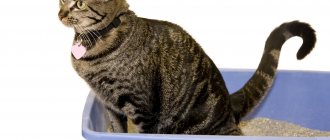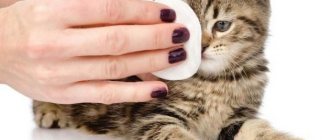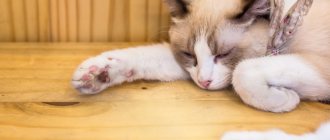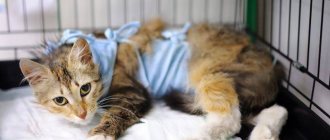Save the article:
No matter how interesting the word halitosis sounds, it means nothing more than a disorder in a pet’s body, characterizing the smell of a cat’s breath . Ideally, no unpleasant odor should be heard from the mouth of a healthy animal: acetone or ammonia indicate a deviation from the norm.
The mouth of a meowing pet is home to many bacteria, both pathogenic and beneficial. The latter help maintain the normal condition of the oral cavity, inhibiting the growth of bad micro-residents, and a violation of this balance brings not only an unpleasant stench from the mouth, but also health problems.
Causes of bad breath in cats
If suddenly your pet opens its mouth, and from there comes the aroma of the Kraken’s mouth, then you urgently need to figure out why the cat has bad breath:
- Age: most often this attack occurs in young animals aged 1-3 years. If a “charming” amber is heard from an elderly cat, the cause is probably a disruption in the functioning of the internal organs.
- Changing baby teeth to permanent teeth: halitosis in kittens is quite rare, but it does happen during the period of teeth change.
- Oral diseases: gingivitis, caries, pharyngitis, stomatitis, cysts and other diseases often smell bad.
- Breed: Brachycephalic breeds (cats with a flattened face) also often cause their owners to suffer from bad breath.
- Problems with internal organs: diseased kidneys, liver, gastrointestinal tract, upper respiratory tract - any organ can betray its illness in this way.
- Inflammation: Any inflammation, from the lungs to an abscess in the oral cavity, can manifest itself as a stench.
- Helminths: as a result of the activity of bacteria, a cat’s mouth develops a bad odor.
Based on the above reasons, it becomes clear that the pet needs to be examined by a veterinarian.
Prevention
There are a number of preventative measures to help avoid this problem. After all, inexperienced owners of baleen-tailed cats mostly encounter such a problem. What should you do to prevent your cat from developing bad breath?
- Regular consultations with a specialist will help avoid these problems.
- It is necessary to teach the kitten to brush its teeth and treat wounds that arise in the oral cavity. Brushing your teeth should be done daily. The veterinary pharmacy has a range of toothpastes aimed at both kittens and adult cats.
- A balanced diet will help avoid the problem of unpleasant odor from your pet’s mouth.
- Special toys, available in a wide range in veterinary pharmacies, will help cope with this problem in cats. Pets, happily gnawing on it, will simultaneously cleanse their teeth and gums of plaque and small food stuck between the teeth.
- You can also try cleaning tartar at home. The veterinary pharmacy has all the necessary products: brushes, gels. If the actions are not successful, then you should seek help from a veterinarian.
Diagnosis of bad odor from a cat's mouth
global $ads_google;
//data-ad-slot=”2475549904″ $ads_google = empty($ads_google) ? false : true; ?> if ($ads_google == false) {?> $ads_google = true; ?> } ?> By the specific smell coming from the pet’s mouth, you can determine the organ that is malfunctioning:
- Smells of acetone: If your cat smells of acetone from its mouth, and this is accompanied by copious amounts of water, the most likely cause is diabetes. Carbohydrates are not digested, and due to the breakdown of fats, ketone bodies that smell like acetone are formed;
- rotten smell of rot: it makes sense to worm the cat. The cause may also be a disease of the digestive system. The stomach may fail because it cannot cope with the cat’s diet;
- ammonia: problems with the kidneys or other organs of the genitourinary system.
- fishy smell: the probable cause is poor oral hygiene and dental disease.
Whatever the cat’s breath stinks , a veterinarian can identify the true cause and prescribe treatment not for the symptom, but for the disease itself.
If not teeth, then...
- If your cat has a problem other than his teeth and still has bad breath, he may have an oral ulcer or tumor. By the way, if the virus gets on the mucous membrane, it can ulcerate it, destroy the enamel and cause the gum tissue to grow. Such diseases can even lead to the death of a pet. Therefore, in order to identify the disease in advance, it is necessary to look into the pet’s mouth from time to time.
- You should also monitor the food you give your cat: you need to feed it correctly, consulting a veterinarian. There is a lot of literature on how to feed cats so that they don’t get sick. If finances allow, you can go to the veterinarian and use an ultrasound to remove plaque from the cat’s fangs.
- If your pet has toothache, then you can’t do without a veterinarian.
- The doctor will remove caries from the fangs and treat the oral cavity with anti-inflammatory drugs. Well, if the inflammation is severe, the animal will be prescribed antibiotics and immunostimulants. If the animal suffers from diseases of the internal organs, it will not be possible to do without surgery.
Reviews from veterinarians about halitosis
Veterinarians often encounter an unpleasant odor from the mouths of cats. The reason for this is often an incorrectly formulated pet diet, which leads to diseases of the stomach, liver, kidneys, and poor oral care of animals.
The owner will definitely be consulted on the proper nutrition of the cat. If the cause of the stench turns out to be poor hygiene, the specialist will recommend brushing the cat’s teeth regularly.
How to get rid of the “smelly” problem?
To remove the stench, you need to find the cause of its occurrence. Only a veterinarian can make a correct diagnosis and prescribe effective treatment. The smell usually disappears after the animal recovers.
There are also special products on sale that help get rid of odor from the animal’s mouth. They are available in the form of tablets, sprays, liquids and powders, but help freshen breath only if the stench is caused by physiological reasons.
Treating cat bad breath
You should not listen carefully to the words of your cat-loving neighbor, who cured his purring dog’s mouth stench in some way. The causes of the problem can be completely different, so the first thing you should do is visit a veterinarian: after the appointment, it will be clear on what principle to treat the disease.
If the trouble was caused by an incorrect menu, then the first thing you need to do is balance your diet. The doctor will prescribe medications that will help eliminate the cause.
Problems with metabolism will be revealed by a blood, urine and stool test, as well as a swab of the oral mucosa. An additional symptom will be diarrhea in the cat or rare bowel movements. The diet will require the exclusion of economy-class feed and food from the host’s table.
If diabetes is suspected, it will require lifelong therapy and veterinary supervision.
If problems with internal organs or chronic diseases are indicated, an ultrasound scan or x-ray is taken.
Sometimes it is difficult to independently assess the condition of the oral cavity, so the cat is shown to a specialist: if periodontitis, tumors, caries, or excessively grown tartar are detected, qualified treatment methods will be taken.
How to remove odor from a cat's mouth
In the case where the cause of a cat’s bad breath is a disease of the cat’s mucous membrane or tartar, then you can cope on your own: brushes and gels can and should be purchased at the veterinary pharmacy that can and should be used to clean the cat’s teeth. It is better to accustom your pet to cleaning from childhood, but if the moment is missed, you will still have to start.
If the examination reveals wounds, then they must be regularly treated with miramistin or hydrogen peroxide 3%: after such simple steps, there is a chance that the cat will have much less bad breath if the cause is wounds or diseases of the oral cavity.
Remedies for cat bad breath
global $ads_google;
//data-ad-slot=”2475549904″ $ads_google = empty($ads_google) ? false : true; ?> if ($ads_google == false) {?> $ads_google = true; ?> } ?> There are several remedies that can help if your cat’s breath stinks.
Fresh Breath Tablets - Beafar company offers products containing chlorophyll. The medicine acts as a disinfectant on the mucous membranes of the mouth and is easily combined with food. The pet is given 2 tablets per day, one in the morning feeding, the second in the evening. The pack contains 40 tablets, the price of the medicine is about 500-800 rubles.
Another product with a lot of positive reviews is called Api-San spray or gel “Zubastic”. The medicine costs about 200-250 rubles. Instructions for use: apply the product only from the factory bottle 2-3 times a day for one or two weeks. Since the animal will experience profuse salivation in the first half hour, food is offered no earlier than 30 minutes after treatment.
Mouth Odor Control Spray is suitable for use on cats. The medication acts by destroying tartar, whitening teeth and strengthening gums. The stench that appears due to lack of oral hygiene is eliminated without harm to the animal’s health. You can spend about 200-250 rubles on the drug Cliny.
Gel Dentavedin is an anti-inflammatory and disinfectant for the care of the oral cavity in cats. By combating gram negative/positive bacteria, yeast and dermaphytes. The gel is rubbed into the gums and teeth. Feed the pussy only half an hour after the procedure. The cost of the drug is on average 70 rubles.
Timely care of the animal’s health will prevent the appearance of a bad odor from the pet’s mouth.
Ears are another reason for the unpleasant odor from the Sphynx
Sphynxes have much larger ears than most other cat breeds, and they also produce earwax much more intensely. Therefore, if you do not clean your pet’s ears for a long time, dust and dirt will accumulate in them, which can lead to the development of otitis media and fungus.
A characteristic manifestation of these diseases is the formation of purulent, bloody or black discharge in the ears with a pungent, repulsive odor. In advanced cases, the stench from the animal’s ears can be so strong that it may seem as if the entire Sphynx smells unpleasant, and not just its ears.
There is a simple explanation for this: ear plaque irritates the cat, provokes itching, as a result of which the animal begins to scratch its ears. Because of this, his paws get dirty and also begin to emit a stench.
To prevent this from happening, it is necessary to thoroughly and regularly clean the Sphynx's ears. To do this, it is recommended to use formic alcohol and cotton pads.
The procedure itself must be performed at least once a week, but it is best to constantly look into your pet’s ears and clean them as necessary. Some animals require only 1 cleaning per month, others, on the contrary, more than 2 times a week. In this matter, everything is very individual.











